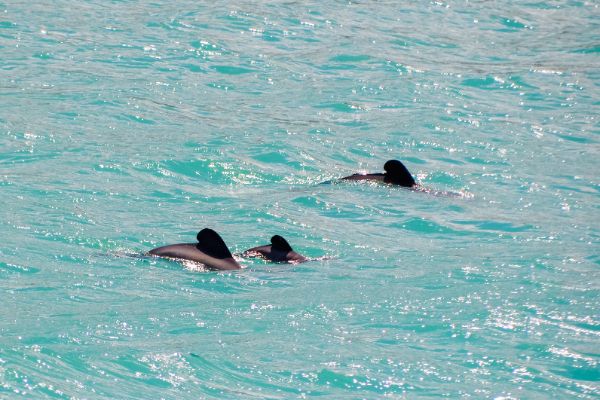First Calves Of Hector’s Dolphin Breeding Season Sighted

Five years to the day on November 29th, Black Cat Cruises spotted its first new-born Hector’s dolphin calf of the season. The date proving popular, as passengers were lucky enough to see not one, but two new-born Hector’s dolphin calves while on-board a Black Cat Cruises tour in the Banks Peninsula on Sunday morning.
The two baby calves were seen swimming alongside their mothers near Akaroa Heads – the first sighting of the breeding season for the endangered species.
“The calves were likely only a couple of days or, at the most, a week old. They came right up to the boat and then quickly swam away – much to the delight of all the passengers on our Akaroa Nature Cruise,” says Black Cat Cruises crew member Dan Hitchcox.
“Hector’s dolphins only give birth once every two to three years and they are not tagged or tracked – making the sighting extra special for everyone on board.”
The endangered dolphins are important to Black Cat Cruises and the region, which is why the tourism operator advocates to ensure the Banks Peninsula Sanctuary is a safe place for dolphins.
The greatest threat to Hector’s dolphins are getting caught and drowned in set nets, where fishers drop nets to the ocean floor and come back later to pull them up. The total Hector’s dolphin population is estimated to be between 10,000 to 15,000 dolphins – down around 74 percent over the last 30 years.
Earlier this year the Government announced some increased protection for native Hector’s and Māui dolphins as part of its Threat Management Plan Review. The changes include a nationwide ban on drift netting, and bans on trawl and set net fishing around the West Coast of the North Island and various parts of the South Island.
However, Black Cat Cruises Chair Paul Bingham says while the changes are a step in the right direction, the “death zone” near Akaroa requires much needed protection for Hector’s dolphins.
“We welcome the new extension to the Marine mammal sanctuary, but we do not feel it goes far enough to provide much needed fishing restrictions in the Banks Peninsula area,” says Bingham.
“The new plan could create a worse situation for local dolphins by forcing fishers out of the proposed new ban areas and into the death zone, there is already a noticeable change with larger trawlers starting to operate in the death zone.
“We hope the Government makes good on its offer to consult further on the Threat Management Plan, specifically on its promise to consult further on extending the commercial and recreational set new bans around Banks Peninsula.”


 Gordon Campbell: On Why Leakers Are Essential To The Public Good
Gordon Campbell: On Why Leakers Are Essential To The Public Good The Tree Council: Auckland Council Notifies Plan Change 113 Notable Trees
The Tree Council: Auckland Council Notifies Plan Change 113 Notable Trees ACT New Zealand: ACT New Zealand Celebration Brunch - David Seymour's First Speech as Deputy PM
ACT New Zealand: ACT New Zealand Celebration Brunch - David Seymour's First Speech as Deputy PM NZ Police: Operation Purple | Anti-Social Road User Gathering In Levin
NZ Police: Operation Purple | Anti-Social Road User Gathering In Levin New Zealand Defence Force: The Latest Update On The HMNZS Manawanui Response
New Zealand Defence Force: The Latest Update On The HMNZS Manawanui Response NZCTU: NZCTU Release Detailed Budget 2025 Analysis
NZCTU: NZCTU Release Detailed Budget 2025 Analysis Department of Conservation: DOC Reveals Surprising Toilet Paper Stats
Department of Conservation: DOC Reveals Surprising Toilet Paper Stats


